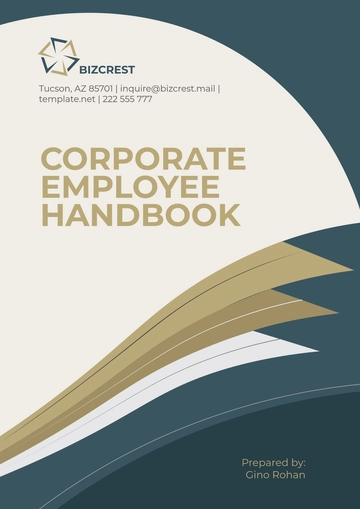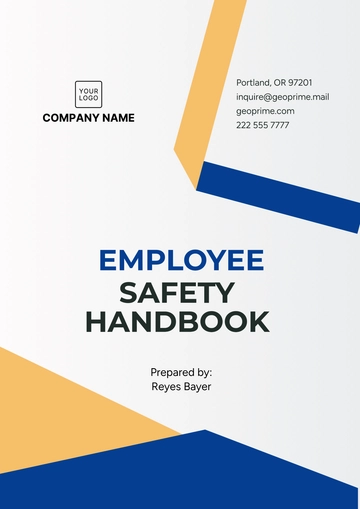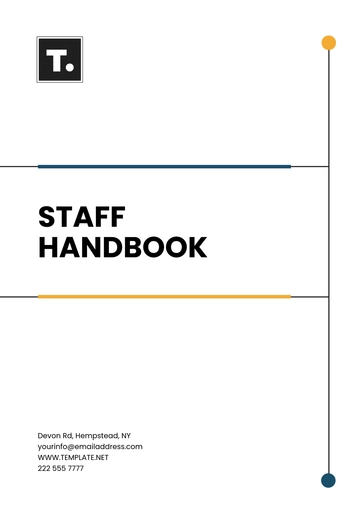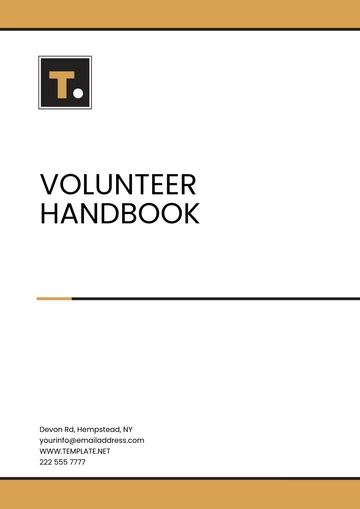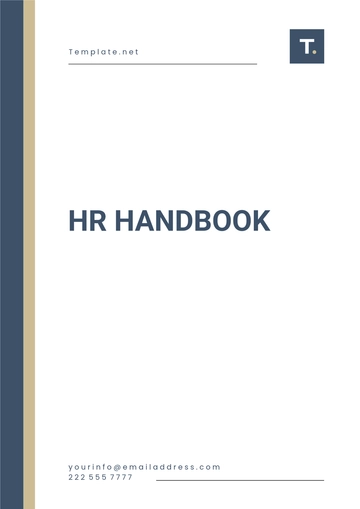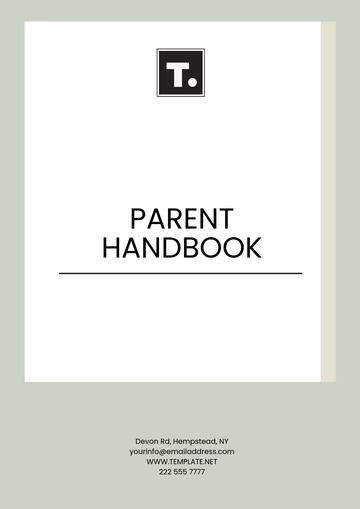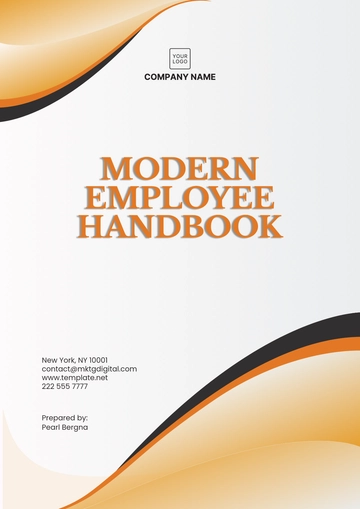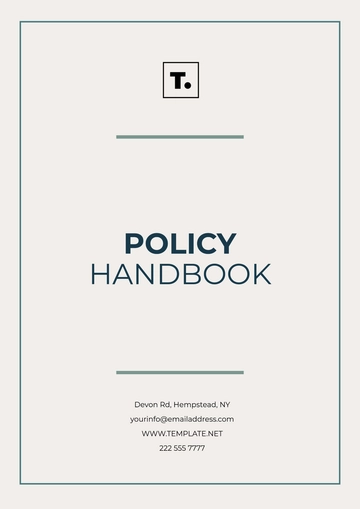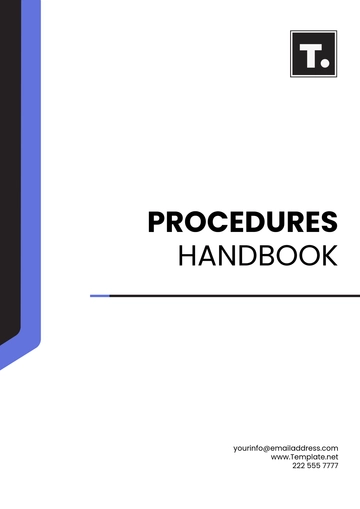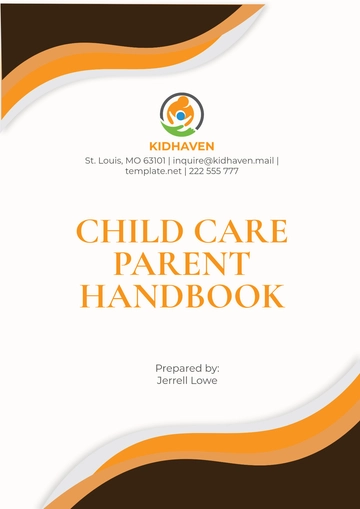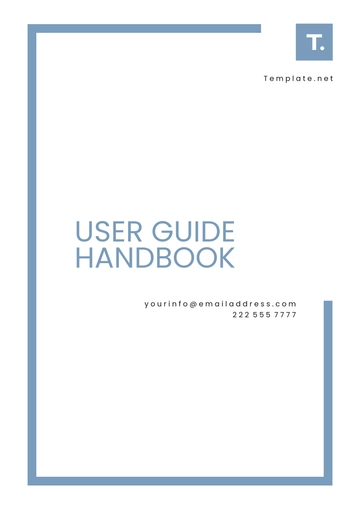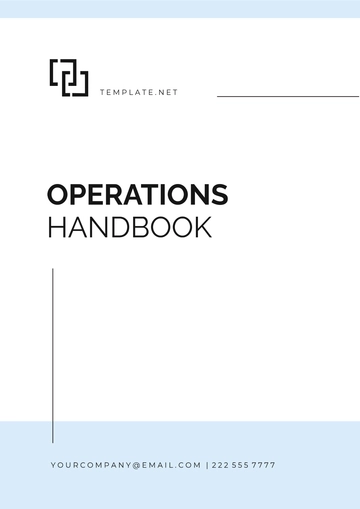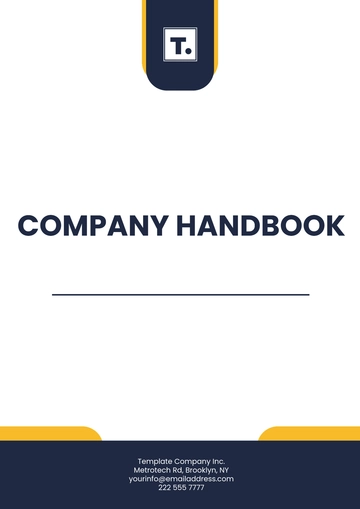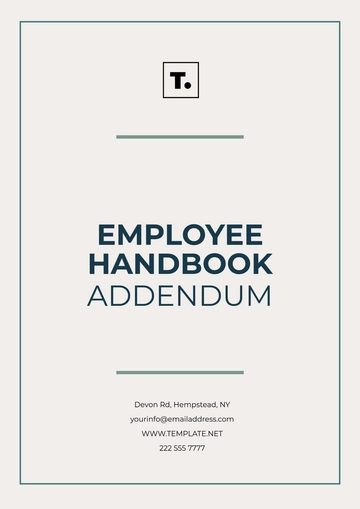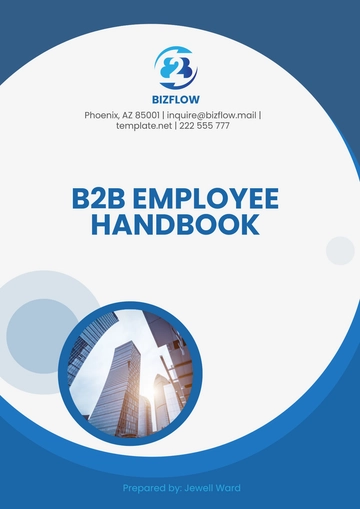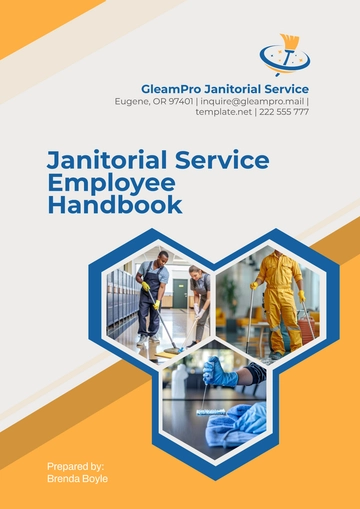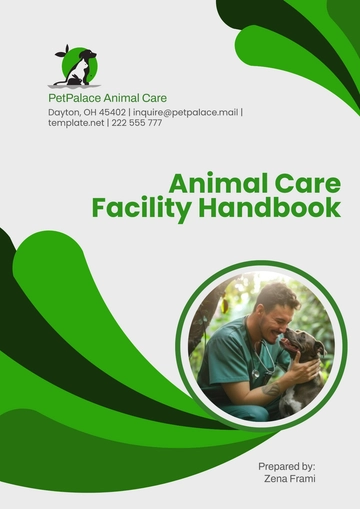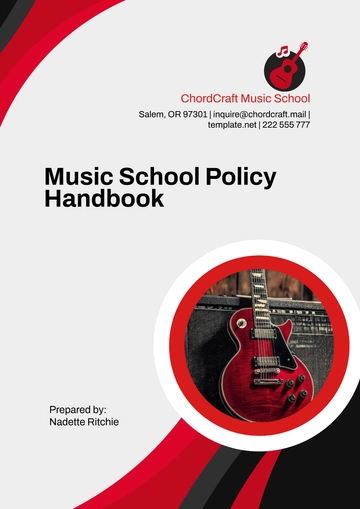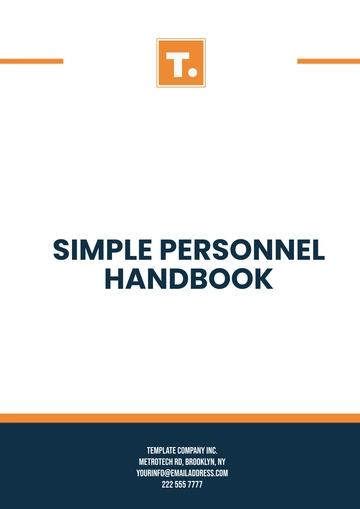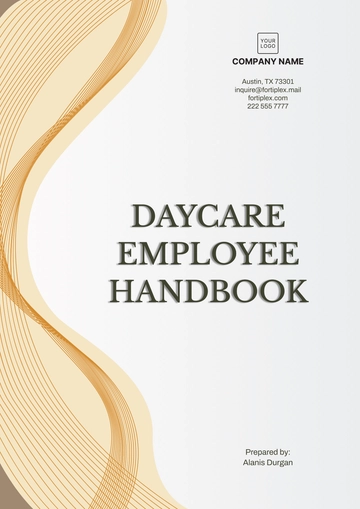Free Church Minister Handbook Format
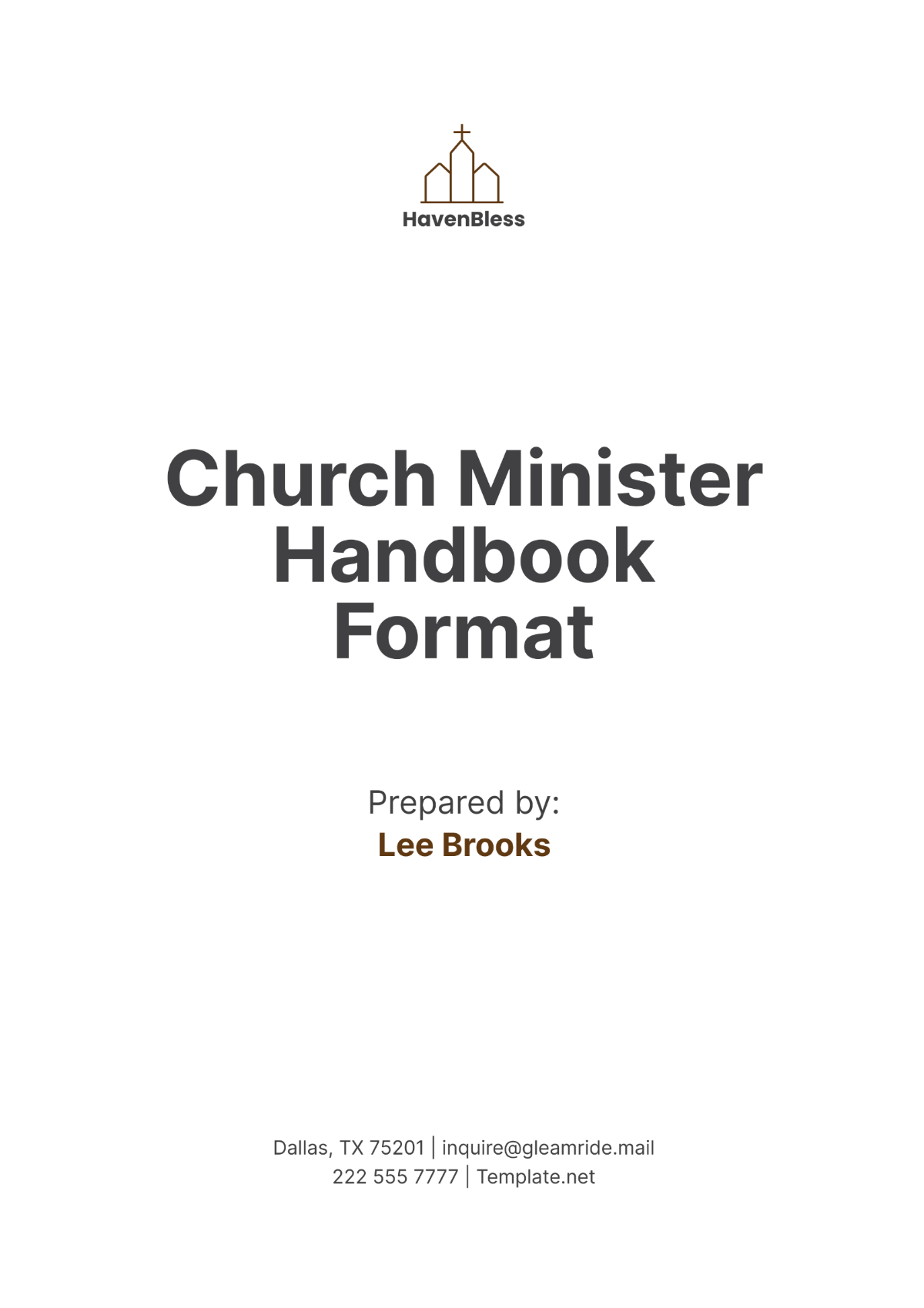
I. Introduction
Welcome to the Church Minister Handbook of [Your Company Name]. This comprehensive guide is designed to support our church ministers in their vital roles, offering a thorough overview of responsibilities, policies, and best practices. Whether you are a newly appointed minister or a seasoned leader, this handbook aims to equip you with the necessary tools to fulfill your duties effectively and with confidence.
In addition to outlining your day-to-day responsibilities, this handbook provides insights into our church’s values, mission, and operational procedures. It is our goal to ensure that all ministers are well-prepared to lead, support, and nurture our congregation. We encourage you to familiarize yourself with this guide and refer to it regularly to align with the standards and expectations of [Your Company Name]. Your dedication and adherence to these guidelines are vital in fostering a vibrant and supportive church community.
II. Roles and Responsibilities
In your role as a church minister, you hold a multifaceted position that is crucial to the spiritual and operational health of [Your Company Name]. Your duties extend beyond leading worship and preaching; they encompass a range of responsibilities designed to foster spiritual growth, offer support, and manage the day-to-day functions of the church. Understanding and executing these roles effectively is essential for maintaining a thriving and supportive church environment.
The following table outlines the key roles and responsibilities associated with your position. It provides a structured overview of your primary duties, helping you to navigate your various tasks and ensure that all aspects of your role are addressed with diligence and care. Please review this table regularly to stay aligned with our expectations and to support the overall mission of [Your Company Name].
Role | Responsibilities |
|---|---|
Spiritual Leadership | Leading worship services, preaching, and providing spiritual guidance. |
Pastoral Care | Offering support and counseling to church members. |
Administration | Overseeing church operations, including finances and staff management. |
Community Engagement | Building relationships within the community and encouraging church involvement in outreach programs. |
III. Code of Conduct
Maintaining a high standard of conduct is essential for church ministers, as it reflects the core values and mission of [Your Company Name]. As a representative of our church, your actions and behavior must align with the principles of integrity, respect, accountability, and confidentiality. This Code of Conduct outlines the ethical guidelines that are expected of you in your role, ensuring that you contribute positively to the church's reputation and foster a supportive environment for all members.
Integrity: Uphold honesty and transparency in all actions. As a church minister, it is vital to be truthful and forthright in all dealings with congregation members, colleagues, and the wider community. This means avoiding deceitful practices, maintaining transparency in financial matters, and ensuring that all communications are clear and honest. Your commitment to integrity will build trust and credibility, reinforcing the church’s commitment to ethical conduct.
Respect: Treat all individuals with dignity and compassion. Every interaction with members of the church and the community should be approached with respect and empathy. This includes listening actively to concerns, honoring diverse perspectives, and fostering an environment where everyone feels valued and heard. Respectful behavior promotes a positive atmosphere and strengthens the sense of community within the church.
Accountability: Be answerable to the church and its congregation. Accountability involves taking responsibility for your actions and decisions, both personally and professionally. This includes adhering to church policies, fulfilling your duties diligently, and being open to feedback and evaluation. Accountability ensures that you are held to high standards and that your conduct consistently reflects the church’s values.
Confidentiality: Safeguard private information shared in confidence. Protecting the confidentiality of sensitive information is crucial in maintaining trust within the church community. This encompasses safeguarding personal details shared by congregation members, as well as any confidential information related to church operations. Ensuring that such information remains secure and private is a fundamental aspect of your role.
Adhering to these guidelines will help you uphold the values of [Your Company Name] and contribute to a positive, respectful, and ethical church environment.
IV. Worship Services
Effective worship services are the cornerstone of a vibrant church community, serving as a key platform for spiritual growth and congregational engagement. As a church minister, planning and conducting these services involves more than just leading prayers and delivering sermons; it requires thoughtful organization and a deep understanding of the needs and expectations of your congregation. Your role in this process is vital for creating a worship experience that is both meaningful and spiritually enriching.
The following table provides a structured approach to organizing worship services. It covers essential elements such as service structure, sermon preparation, and inclusive practices, offering practical guidelines to help you craft services that resonate with and engage all attendees. Reviewing and implementing these practices will support your efforts in leading impactful and inclusive worship experiences.
Aspect | Guidelines |
|---|---|
Service Structure | Outline the order of worship, including prayers, readings, hymns, and sermons. |
Sermon Preparation | Tips on crafting sermons that are biblically sound and relevant to the congregation. |
Inclusive Practices | Ensure services are welcoming and inclusive for all attendees. |
V. Pastoral Care
Providing pastoral care is a fundamental aspect of a minister’s role, vital for fostering spiritual growth and emotional well-being within the church community. Effective pastoral care involves a compassionate approach, active listening, and a commitment to supporting members through various life challenges. This section outlines essential techniques and best practices to help you offer meaningful support to those in need.
Listening Skills: Developing active listening skills is crucial for understanding the needs and concerns of church members. Active listening involves giving your full attention to the speaker, acknowledging their feelings, and responding empathetically. This practice helps build trust and ensures that members feel heard and valued. Techniques such as reflective listening, where you paraphrase what the person has said to confirm understanding, can be particularly effective. You may foster a friendly atmosphere where others feel at ease talking about their problems and asking for advice by developing these abilities.
Counseling Techniques: Offering effective counseling requires a balance of empathy and professional boundaries. As a minister, you should be equipped to provide supportive counseling while recognizing the limits of your expertise. Familiarize yourself with basic counseling techniques, such as establishing rapport, setting goals, and providing emotional support. However, it’s important to know when to refer individuals to mental health professionals or specialized counselors for more intensive support. Maintaining these boundaries ensures that you are providing the best care possible while protecting your own well-being.
Visitation: Visiting sick or homebound members is a key aspect of pastoral care that reinforces the church’s commitment to its community. Regular visitation provides comfort and support to those who are unable to attend services or participate in church activities. It also helps strengthen the minister’s connection with the congregation. During visits, offer prayers, engage in meaningful conversations, and provide practical assistance if needed. These interactions are vital for maintaining a sense of community and ensuring that all members feel connected to the church, regardless of their physical limitations.
VI. Church Administration
Efficient church administration is crucial for ensuring that all aspects of church life run smoothly and effectively. As a church minister, your role in administration extends beyond spiritual leadership to encompass a range of operational responsibilities that support the church’s mission and daily functions. Proper management in areas such as finances, staff, and facilities is key to maintaining a well-organized and responsive church environment.
The table below provides a detailed overview of essential administrative responsibilities. It includes guidelines for financial management, staff oversight, and facility maintenance. By following these best practices, you can ensure that the administrative functions of [Your Company Name] are handled with efficiency and integrity, supporting the overall success of the church’s operations.
Administrative Area | Guidelines |
|---|---|
Financial Management | Oversee budgeting, fundraising, and financial stewardship. |
Staff Management | Hiring, training, and managing church staff and volunteers. |
Facility Management | Maintaining the church property and facilities. |
VII. Community Engagement
Building strong community relationships is essential for amplifying the church’s mission and fostering a sense of connection beyond the church walls. Engaging with the broader community not only extends the church’s impact but also strengthens its role as a positive force in society. Effective community engagement involves outreach programs, partnerships, and advocacy, each contributing to a holistic approach to service and collaboration.
Outreach Programs: Developing and promoting outreach programs is a key way to serve the community’s needs and demonstrate the church’s commitment to making a difference. These programs can address various needs, such as food security, education, and health care. To create successful outreach initiatives, assess the community’s needs through surveys or consultations, and tailor programs to address these areas effectively. Involve church members in planning and execution to ensure programs reflect the values and strengths of the congregation. Effective outreach not only benefits those served but also enriches the church community by fostering a spirit of compassion and service.
Partnerships: Establishing partnerships with other organizations and faith communities can enhance the church’s ability to address community needs and expand its reach. Collaborate with local non-profits, schools, and civic groups to co-host events, share resources, and support joint initiatives. Building relationships with other faith communities can also create opportunities for interfaith dialogue and cooperative projects, fostering mutual understanding and respect. These partnerships can leverage additional resources and expertise, strengthening the church’s impact on local and regional issues.
Advocacy: Advocating for social justice and community well-being is an important aspect of the church’s role in society. Engage in advocacy efforts that align with the church’s values and mission, addressing issues such as inequality, environmental sustainability, and human rights. This may involve participating in community forums, supporting legislative initiatives, or raising awareness through educational campaigns. Effective advocacy requires a commitment to understanding the issues, building coalitions, and mobilizing the church community to take action.
VIII. Professional Development
Continuous learning and development are essential for maintaining effectiveness and relevance in church ministry. Engaging in ongoing education, networking, and self-care helps ensure that you remain a dynamic and resilient leader. By investing in your professional growth, you enhance your ability to serve the congregation and lead with purpose and passion.
Education: Engaging in theological education and continuing education opportunities is vital for deepening your understanding of faith and ministry practices. Pursue advanced degrees, attend seminars, or participate in workshops related to theology, biblical studies, and ministry skills. These educational experiences provide valuable insights and equip you with updated knowledge and tools to address contemporary issues in ministry. Additionally, staying informed about current theological debates and emerging trends within the church helps you remain relevant and effective in your role.
Networking: Connecting with other ministers and religious leaders offers numerous benefits, including support, collaboration, and shared learning. Join professional associations, attend conferences, and participate in interfaith dialogues to build a network of peers and mentors. Networking provides opportunities for exchanging ideas, discussing challenges, and collaborating on projects that enhance your ministry. Establishing relationships with fellow leaders can also offer emotional and professional support, helping you navigate the complexities of church leadership.
Self-Care: Practicing self-care is crucial for maintaining personal well-being and preventing burnout. Ministry can be demanding, and neglecting your own health and emotional needs can impact your effectiveness and satisfaction in your role. Incorporate regular self-care practices into your routine, such as exercise, hobbies, and time for reflection and relaxation. Seek support through counseling or spiritual direction if needed, and set boundaries to ensure a healthy work-life balance. By prioritizing your own well-being, you sustain your ability to lead with vitality and compassion.
Investing in education, networking, and self-care will enhance your effectiveness as a church minister and contribute to a fulfilling and impactful ministry. Embrace these opportunities for growth to support both your personal development and the broader mission of [Your Company Name].
IX. Conclusion
As you embark on your journey with [Your Company Name], this handbook serves as a valuable resource to guide and support you in your role as a church minister. By understanding and implementing the guidelines and best practices outlined in this document, you contribute to the vibrant and supportive community that is central to our mission. Your dedication to spiritual leadership, pastoral care, and community engagement is crucial in fostering a nurturing environment for our congregation.
Remember, the principles and practices detailed here are designed to enhance your effectiveness and well-being as a minister. Embrace opportunities for growth, remain committed to the values of integrity and compassion, and continually seek ways to strengthen your service to the church and its members. Your efforts are deeply appreciated and play a significant role in advancing the mission of [Your Company Name].
- 100% Customizable, free editor
- Access 1 Million+ Templates, photo’s & graphics
- Download or share as a template
- Click and replace photos, graphics, text, backgrounds
- Resize, crop, AI write & more
- Access advanced editor
Equip your ministers with the Church Minister Handbook Format Template from Template.net. This fully editable and customizable template offers a structured format for creating comprehensive handbooks. Easily personalize it using our Ai Editor Tool to include guidelines, policies, and responsibilities, ensuring a well-organized and informative resource for your church’s ministers.
